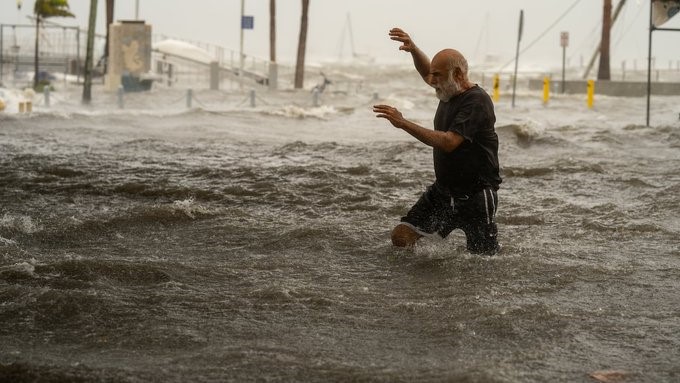Hurricane Helene Wreaks Havoc Across Southeastern US
A historic hurricane has left a trail of destruction across the southeastern United States, causing significant loss of life and widespread damage.
Published October 01, 2024 - 00:10am

Image recovered from lapagina.com.sv
At least 42 people have been killed, streets inundated by an unprecedented storm surge, structural damage, and more than four million people left without power are the bleak aftermath in the southeastern United States following Hurricane Helene's impact as a Category 4 storm.
Helene made landfall just after 11:00 PM local time on Thursday near Perry, in Florida's Big Bend region, with sustained winds of 225 km/h. The southeastern US experienced Helene's destructive path as it downgraded to a tropical storm upon making landfall. According to PowerOutage.us, the storm left more than four million homes and businesses across the region without electricity.
Florida's Big Bend area woke up to streets covered with fallen trees and power lines, with areas flooded by a storm surge at least three meters above normal levels. Videos and photos captured massive waves crashing into bridges and homes in coastal areas that were nearly submerged.
In Cedar Key, where Helene made landfall and caused a 2.7-meter rise in sea level, patrols began removing trees from main highways early in the morning to maintain an open route for emergency responders. Over 700 flights have been canceled, primarily at major airports including Charlotte in North Carolina, Atlanta in Georgia, and Tampa in Florida.
Tallahassee, the capital of Florida, avoided direct impact due to the storm's eastward shift, while Atlanta remains under a state of emergency due to flash flooding in its metropolitan area. Atlanta's Mayor, Andre Dickens, reported that at least 20 people were rescued overnight from flooded homes and cars. Georgia's governor, Brian Kemp, noted that several southern hospitals lost power, and emergency crews are working to reach residents trapped in their homes.
Meanwhile, former President Donald Trump accused Democratic officials of withholding Hurricane Helene relief aid from Republican areas of North Carolina. Trump stated on Truth Social that he was headed to Valdosta, Georgia, to provide aid but expressed concerns about reports suggesting that local and federal officials were not helping Republican communities. These claims, made without evidence, were criticized for politicizing a natural disaster. North Carolina's Democratic governor had already deployed the National Guard, and President Biden had pledged to provide all necessary resources.
The National Hurricane Center warned that Helene continues to generate dangerous winds and life-threatening floods in parts of the southeastern US and the southern Appalachians. The storm, now with maximum sustained winds of 75 km/h, is rapidly moving north at 52 km/h, weakening as it progresses inland.
In the aftermath, Georgia confirmed 11 deaths, including a rescuer, while Pinellas County, Florida reported five fatalities. North Carolina saw at least one death caused by a fallen tree. This hurricane is noted as the strongest to hit Florida's Big Bend. On top of this, scientists link extreme weather events, such as those caused by Helene, to human-induced climate change, though definitive conclusions on the current month are premature.
In South Carolina, the storm claimed 19 lives, Georgia suffered 15 casualties, Florida seven, North Carolina two, and Virginia one, making the total death toll rise. Rescue teams are working to restore power and manage the catastrophic flood aftermath that destroyed homes, roads, and businesses across several states. Governor Roy Cooper of North Carolina described parts of the state as enduring one of its worst storms in modern history.
More than 2.2 million people are without electricity nationwide as Helene wreaked havoc on supply infrastructure and communications networks. FEMA confirmed extensive damage to water supply, roads, and essential routes, predicting better weather beginning Tuesday.
In addition to the devastation caused by Helene, southern states also confronted former President Trump's accusations against the Biden administration's handling of hurricane relief. Trump's unfounded claims highlighted the ongoing political polarization, even amid natural disasters, criticizing the response efforts while current officials were actively managing rescue and recovery operations.







